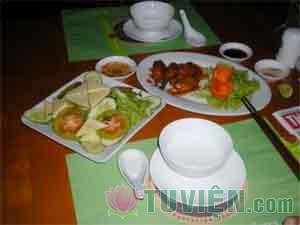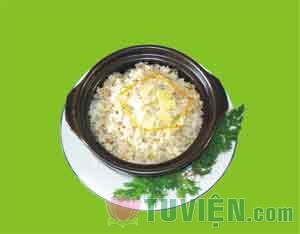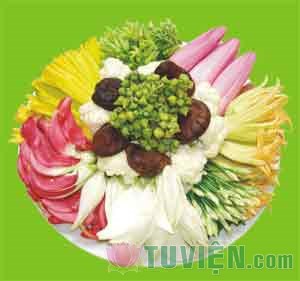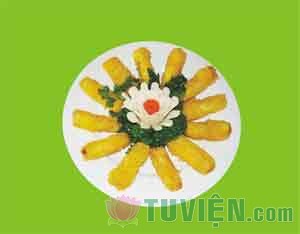Faux Meat for Very Real Seasons
 |
| A family enjoy the cozy atmosphere at Viet Chay Restauranton in Vu Lan day |
The Ullambana day, also known as Vu Lan day, sets off a month of fasting for many Vietnamese Buddhists wishing to express their respect and gratitude for the sacrifice and devotion of the parents in the present and past lives.
Ancestral worship is a deeply intrinsic part of Vietnamese culture and tradition, rooted in the belief that the dead do not cease to exist, but that their souls go back to their origins. As an ancient Vietnamese saying goes: “Living is to rely on each other to exist and dying is to get back.” The birth and happiness of every human being depends on the unconditional love, immense sacrifice and devotion of his or her parents, and stretches back into many lifetimes.
This tradition was further reinforced with the advent of Buddhism, first introduced into the country 2,000 years ago. The Buddha’s teaching that “Nothing is more sinful than being ungrateful to parents and nothing is more noble than being grateful to parents” tied well into existing social mores and beliefs in Vietnamese society.
 |
| Viet Chay's chicken legs with sauce in Thai style |
The story behind Vu Lan is that of Maudgalyayana, one of the Buddha’s great disciples. One day, Maudgalyayana, through his meditation, saw his deceased mother suffering in hell because of her karmic debt assumed through a life of stinginess and greed. After using his spiritual prowess in vain to mitigate the suffering of his mother, Maudgalyayana sought the Buddha’s intervention. Following the Buddha’s advice, Maudgalyayana held an offering ceremony to the Sangha on the 15th day of the seventh Lunar month and prayed with them for the liberation of his mother’s soul. The combined strength of the Sangha not only saved his mother but also helped his forefathers escape suffering and attain eternal bliss.
Maudgalyayana’s love and devotion to his mother became a shining example for Buddhists of the Mahayana tradition in countries such as China, Japan and Korea. Vietnamese Buddhists thus observe the Vu Lan day by trying to do noble deeds and pass on the merits thereof to their parents in order to ensure their longevity and happiness.
The tradition of observing the Vu Lan day has now become a month long festival during which Buddhists flock to temples and pray for their parents’ good heath and peace of mind. One of them most important noble deeds that is performed is a shift to a vegetarian diet, showing compassion towards all living beings by avoiding meet. Abstaining from killing any sentient being is one of the five basic precepts of Buddhism.
 |
| Viet Chay's bamboo-tube rice |
From the first day of the seventh Lunar month, vegetarian restaurants begin to serve a wide variety of faux meat dishes to attract non-vegetarian Buddhists who switch to a vegetarian diet for the month.
Gone are the days when vegetarians, temporary or otherwise, had to travel miles in the city to find a small restaurant that served a few popular dishes for a simple meal. Over the past decade, numerous vegetarian restaurants, some of them serving expensive fare, have sprung up to meet the increasing demand for meatless food from people who chose it either for religious reasons, as a means to promote good health, or for humanitarian considerations. It has become easy to find two or three decent vegetarian restaurants in the same neighborhood now.
International tourists who are vegetarians or vegans have a bonanza waiting for them if they enter the Ho Chi Minh City during the Vu Lan season. The hearty vegetarian buffets offered by elegant restaurants including Van Canh, Majestic, Dong Khanh, Thien Hong and A Dong present myriad selections from Vietnamese, Thai, Chinese, Japanese and French cuisines.
 |
| Beautiful, bountiful: An eye- catching arrangement of many ingredients used in vegeterian cooking |
Apart the usual dishes made with vegetables, fruit, beans, mushroom, tofu and youpi (dried skin on soy milk), there are many special vegetarian versions of Vietnamese classic cuisine like pho, lau (hot pot), xoi ga (sticky rice with roasted “chicken”), and banh hoi thit nuong (vermicelli noodle cakes with grilled “pork”). The mock meat in these dishes look and taste surprisingly meat-like. Gourmets of Chinese cuisine cannot turn away from the Beijing roast “duck” which consists of youpi, cucumber and mushrooms wrapped in thin rice-girdle cakes. The genius of this dish lies in the duck-like youpi that gives diners the feeling of eating a genuine Beijing roast duck.
For those with a spicy inclination, Viet Chay's roasted “chicken legs” with a Thai-style sauce are an irresistible treat. There is also a good choice of salads in Greek, French and Russian styles for the weight watchers.
 |
| Viet Chay' s fried sring rolls |
The large variety of dishes and a desire to sample meatless fare are not the only reasons that attract customers to the more expensive vegetarian restaurants.
Sitting together with other family members around a long table in Viet Chay, an elegant restaurant in Vinh Nghem Temple's precinct, 32-year old Minh observes: “ I always eat in a small restaurant if I have to eat out alone. Today is an exception. I’ve taken my mother and my family here to enjoy the cozy atmosphere of a family reunion. My father passed away, but we are still lucky to have our mother with us. We all wish to make today a special day for her.” Fittingly, they had chosen Vu Lan as the special day
By Phuong Lan (Saigon-gpdaily)
Ngọc Sương (Tuvien.com)



